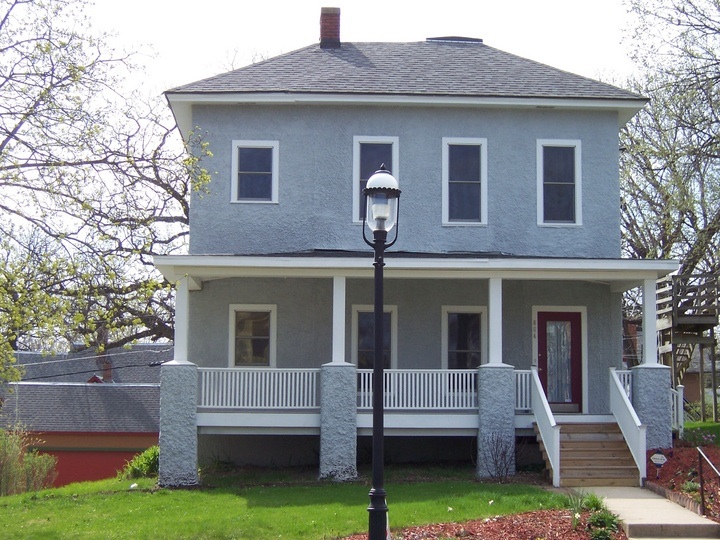| Revision as of 15:27, 24 January 2004 view sourceGhouston (talk | contribs)Extended confirmed users2,750 edits Linking a photo of some brick houses.← Previous edit | Revision as of 02:02, 10 February 2004 view source DavidLevinson (talk | contribs)Administrators15,860 edits LustronNext edit → | ||
| Line 22: | Line 22: | ||
| Among the first examples (according to the estimated age of archaeological retrievals), notable are the ]s. | Among the first examples (according to the estimated age of archaeological retrievals), notable are the ]s. | ||
| See also |
== See also == | ||
| *] | *] | ||
| *] | *] | ||
| Line 29: | Line 29: | ||
| *] | *] | ||
| *] | *] | ||
| * ] | |||
| ---- | ---- | ||
Revision as of 02:02, 10 February 2004

House painted blue
A house in its most general sense is a human erected structure, consisting of enclosing walls and having a roof. It provides shelter against precipitation, wind, heat, cold and intruding humans and animals. People may be away from home most of the day for work and recreation, but typically are home at least for sleeping.
A house generally has at least one entrance, usually in the form of a door or a portal, and may have any number of windows or not at all.
An alternative is living in an apartment in a larger building.
Houses have been used as living quarters for humans since prehistoric times, soon after they left caves, and construction materials, styles and methods of construction have varied wildly over time.
Houses in Fishpool Street, St Albans, EnglandPopular modern house construction techniques include stick-frame construction in areas with abundant wood and rammed-earth construction in arid regions with scarce wood resources.
Early European houses were mere single roomed shacks without windows in which entire families and their cattle lived, keeping the house and each other relatively warm during winter.
Among the first examples (according to the estimated age of archaeological retrievals), notable are the palafittes.
See also
- List of house types
- Penthouse
- Co-housing
- council house
- Parker Morris Committee
- Housing estate
- Lustron
Simpler forms of shelter include a tent, camper, a roof without walls, or a structure with roof and partial walls, such as often at a bus stop (see picture there).
In history, a House is a dynasty, a familiar descendance, often in the sense of Royal House.
In music, House refers to
- a production company (Casa Ricordi, Ricordi House)
- a subgenre of electronic music; see house music.
See also